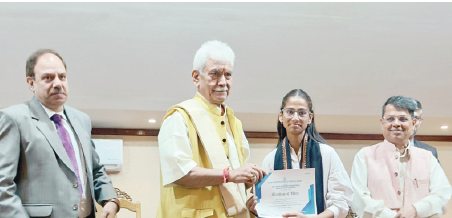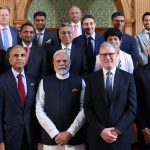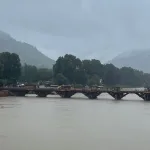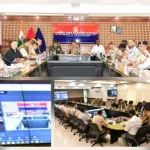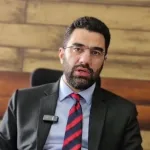Pulwama, July 24:Lieutenant Governor Manoj Sinha on Thursday emphasised the crucial role of Jammu and Kashmir’s development as an essential foundation for achieving the national vision of Viksit Bharat@2047.
Addressing a gathering at the Islamic University of Science and Technology (IUST), Awantipora, during the Viksit Bharat Yuva Connect Program, the LG called upon the youth to become active contributors in nation-building and policymaking.
The program, launched by the Ministry of Youth Affairs and Sports, aims to foster structured youth participation, providing a platform for young minds to engage in dialogues with policymakers, share innovative ideas, and take ownership of India’s development journey.
Speaking on the occasion, the LG stressed that the dream of a developed India remains incomplete until Jammu and Kashmir itself is fully developed. He particularly highlighted Pulwama district’s progress, stating, “Many ask when Viksit Bharat will be realised. Until we create a developed Jammu and Kashmir, the dream of a developed India will remain incomplete. And J&K’s development will remain incomplete until Pulwama district is fully developed.”
He praised the transformation witnessed at IUST over the past four years, describing the university’s progress as a source of inspiration not only for higher education institutions in Jammu and Kashmir but across India. He further announced that on August 12, 2025, Prime Minister NarendraModi will formally launch the Viksit Bharat Yuva Connect Program, during which students and faculty from 1,339 universities nationwide will simultaneously participate and engage with the Prime Minister.
The LG acknowledged the enthusiastic participation of IUST students in pre-launch activities such as registration on the My Bharat portal, Youth Parliament sessions, NashaMukt Bharat Abhiyaan, debate competitions, and extensive discussions on the youth’s role in nation-building. He lauded students from diverse academic disciplines for engaging in meaningful deliberations to draft a roadmap for the country’s development.
Highlighting the vital role of youth in India’s future, the LG remarked that young people constitute over 50 percent of the population and represent the nation’s most valuable resource. “I firmly believe that the youth — holders of these unique qualities — are a powerful force for change,” he said. Despite the challenges and rapid changes of the 21st century, he asserted, “It is the youth who can bring about a real economic and social revolution.”
The LG urged the youth to adopt Prime Minister Modi’s “PanchPran” (five pledges) and move forward with the resolve of putting the nation first. He emphasized that the ideals of initiative, leadership, self-confidence, persistence, imagination, and courage — even the courage to learn from failure — would guide them on the path toward a developed India.
Calling on universities to play a central role in economic growth, LG Sinha said, “We can achieve the resolution of Viksit Bharat only when our universities are Viksit, when our districts are Viksit, and most importantly when Jammu and Kashmir is Viksit.” He urged IUST to continue its progressive reforms and work towards establishing a semiconductor lab in line with India’s push for technological self-reliance.
Addressing the challenge of drug abuse among youth, the LG reaffirmed his administration’s commitment to making every university in Jammu and Kashmir drug-free. He outlined several measures to tackle the menace, including mandatory anti-drug pledges at admission, the formation of “Say No to Drugs” student committees supervised by faculty, confidential reporting systems, access to Tele-MANAS helplines, and integration of drug de-addiction content into academic curricula. “Only drug-free campuses can contribute meaningfully to nation-building,” he stressed.
Paying tribute to SardarVallabhbhai Patel, LG Sinha urged students to dedicate themselves to building a unified and inclusive India. Quoting the Iron Man of India, he said, “The nation’s welfare lies in the hands of its youth, and every son and daughter must be educated to actively take part in nation-building.” He also highlighted the importance of integrating India’s rich cultural heritage and knowledge systems into modern life, stating that the golden era envisioned for 2047 will not arrive on its own but must be realized through the efforts of youth.
During the event, LG Sinha administered the “Viksit Bharat Shapath,” a collective pledge of commitment to the nation’s progress, and released IUST’s Institutional Development Plan, which outlines a roadmap for academic excellence and future readiness. Vice Chancellor Prof. Shakil Ahmad Romshoo presented how the vision of Viksit Bharat@2047 is being integrated into the university’s administrative, academic, research, and outreach activities.
The program also included an interactive “YuvaSamvad,” where students and officials discussed civic responsibilities, national development, and current social issues. The event concluded with the screening of “Sardar @150,” a visual tribute to Sardar Patel’s life and legacy.
The event was attended by Additional Chief Secretary Higher Education Shantmanu, Deputy Commissioner PulwamaBasharatQayoom, Dean Academic Affairs Prof. A.H. Moon, Registrar Prof. Abdul Wahid, along with senior officials, faculty members, heads of departments, and hundreds of students.


